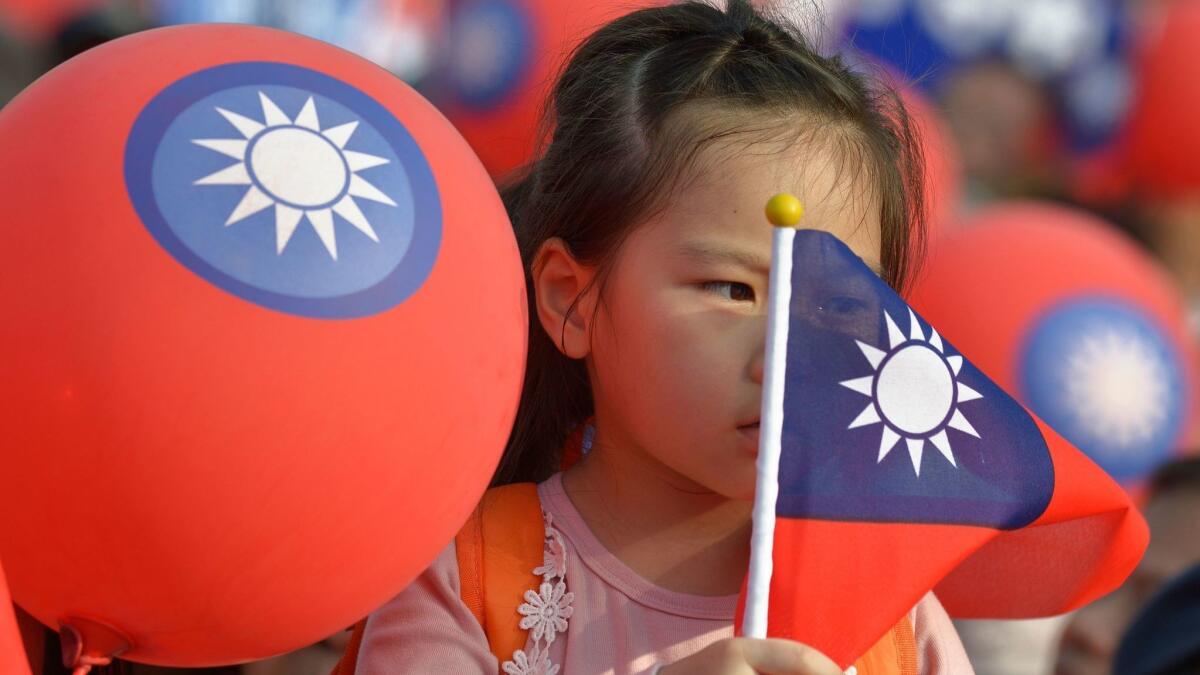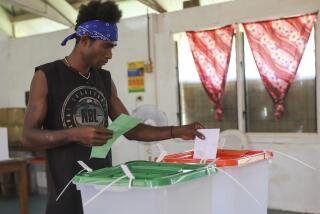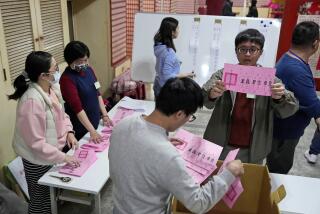Taiwan elections seen as a referendum on the island’s icy relationship with China

Taiwanese will vote Saturday in midterm local elections that are seen as a test for the ruling party and a referendum on the island’s chilly relations with China, which has ramped up pressure on Taiwan to abandon any thought of independence.
Should President Tsai Ing-wen’s Democratic Progressive Party lose two or three major races, it would sound a warning to her to expect a difficult reelection bid in 2020, analysts say. Gains would give the president — whose public approval ratings have sagged — a boost.
“If the Democratic Progressive Party wins most of the elections, then that would jack up the reputation or the status of Tsai Ing-wen,” said Shane Lee, political scientist at Chang Jung Christian University in Taiwan.
Tsai’s party won 13 legislative seats in the 2014 midterms, leaving the rival Nationalists with six and independents with the other three. Tsai won the presidency by a landslide in 2016 over the then-ruling Nationalist Party, which had angered many voters with its cozy relations with China.
Under Nationalist President Ma Ying-jeou’s eight-year tenure, Beijing and Taipei set aside their political differences and signed more than 20 agreements on trade, transit and investment.
Tsai instead has snubbed Beijing and pushed back against its insistence that Taiwan and China are a single country. China has reacted with provocation to Tsai’s stance — sending an aircraft carrier fleet into nearby waters, paring back Taiwan-bound group tourism and pressuring countries that recognize Taipei diplomatically to switch their allegiance to China.
In February, Beijing announced 31 incentives that were meant to win over Taiwanese by making it easier for them to work and invest in China, whose economy is larger and growing faster.
China has claimed sovereignty over Taiwan since the Chinese civil war of the 1940s, when Nationalists lost to the Communists and rebased in Taipei. Government survey show more than 70% of Taiwanese now oppose Beijing’s goal of eventual unification.
But some in Taiwan want Tsai to rekindle relations with Beijing or, conversely, take an even tougher stand against China.
“China is just bullying us, but each side is a separate country,” Taiwanese businessman Liu Ming-chen, 60, said at an October rally to protest Beijing and scout for sympathetic local election candidates. “The Democratic Progressive Party is a little bit better than the Nationalists, but they haven’t met our expectations.”
Voters will choose from among 20,863 candidates for 11,047 offices, mostly at the lowest levels of government, such as urban boroughs with just a few thousand residents. The bellwether races are for 22 mayoral and county magistrate seats.
Voters will also decide the fate of 10 ballot measures Saturday, among them five that touch on the legality of same-sex marriage and whether LGBTQ issues should be taught in schools. Strong opposition would complicate last year’s court order for legalization of same-sex marriage, a milestone that LGBTQ activists said would be a first for Asia.
Activists are mobilizing first-time voters for the gay marriage rights measures because “a lot of younger people understand the idea of gender equality,” said Chang Ming-hsu, project manager with the Taipei-based advocacy group Gender Equity Education Coalition. Religious groups here oppose same-sex marriage.
Taiwan’s 19.1 million voters will pick candidates based largely on perceptions of who can improve local economies or build better public infrastructure, campaign officials say.
“Of course regarding the party’s reforms, whether they’re good or bad, fast or slow, people have different opinions, so local elections will test whether people are satisfied or not with the party in power,” said Hung Lee-chi, spokesman for the ruling party’s Taipei mayoral candidate Yao Wen-chih.
Tsai received a 31.2% approval rating in August, her lowest since taking office, the Taiwanese Public Opinion Foundation said.
But many Taiwanese cheered her cuts to public employee pensions in mid-2018 and an earlier push for laws giving common workers more time off. Her government also is championing a set of regulations aimed at making it easiker for small businesses in Taiwan to thrive. The $572-billion economy is on track to extend last year’s growth and unemployment was below average at 3.68% in June.
China has not taken a stand in the elections, but the Taiwanese government’s Mainland Affairs Council nonetheless has accused Beijing of making statements that were “disturbing Taiwan society” before the vote.
Jennings is a special correspondent.
More to Read
Start your day right
Sign up for Essential California for news, features and recommendations from the L.A. Times and beyond in your inbox six days a week.
You may occasionally receive promotional content from the Los Angeles Times.






